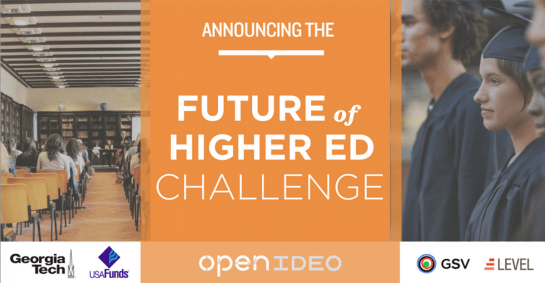What Happens When A University Imagines Its Future in Generational Terms? #FutureHigherEd

Today’s post from the openIDEO #FutureHigherEd Challenge is from my very own institution. It concerns Georgia Tech’s Commission on Creating the Next In Education (CNE), a group that has been asked to look out ten years or more (well beyond any planning horizon) and recommend investments, experiments, pilots, projects, partnerships, and ecosystems that would help guide the choices of future leaders to maintain or even improve the Institute’s mission to provide the best and most valuable education to new generations of learners:
Georgia Tech’s mission to define the technological university of the 21st century is not strategic boilerplate. It is a beacon. It is tempting to conclude that future success will follow from continuing the successful strategies of the last 130 years — that the same beacon will attract new generations of scholars and students. That may be true, but it is equally likely that the Georgia Tech student of 2030 will be different in fundamental ways from the student of generations past. The changing landscape of a Georgia Tech education is evident to anyone who looks at the numbers.
Armed with extensive data and a charge from the Institute, CNE will have a rare luxury: adequate time to develop ideas that might be acted upon. The mid-21st century is well beyond Georgia Tech’s current planning horizon. The Commission’s role is not to engage in premature planning but rather to consider the ideas, experiments, and novel ways of organizing that can inform future strategy…
“The Commission will lead Institute-wide discussions of fundamental questions surrounding topics such as the knowledge 21st century students should gain and how sustained lifelong learning differs from the transformational learning experience of recent high school graduates. In a sense, CNE is an opportunity to deepen the knowledge needed for the Georgia Tech community to pursue strategic ‘options’ that can be exercised over the next 20 years.
Do you know of any other efforts that have this scope and charge? If so, how did those projects turn out? Is there advice you can give to the Georgia Tech team as it enters its ideation phase?

I haven’t seen anything like this, aside from short-lived projects like Stanford’s, or the Institute for the Future’s sporadic work.
LikeLike